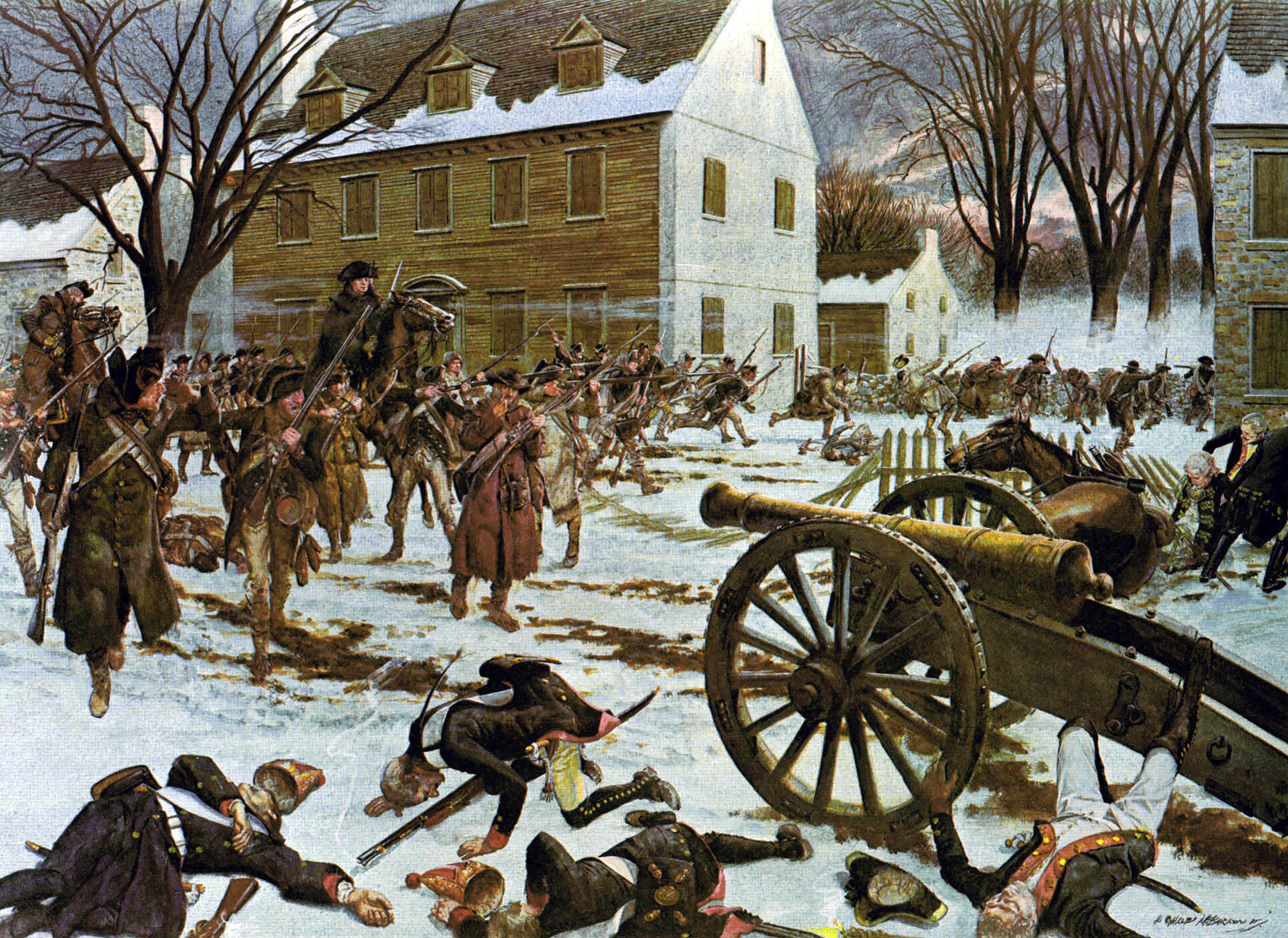“Battle of Trenton” by Charles McBarron, depicting the Patriots storming the streets of the town with fixed bayonets.
By December, 1776, the war for independence was not going well for the Patriots.
The year had started with a win, as the New England militias under command of General George Washington forced the British to evacuate Boston in March. Yet, the remainder of the year would host a series of defeats for Washington & his army: they would suffer a great defeat at the Battle of Brooklyn Heights, and subsequently forced to abandon New York City on lower Manhattan Island soon after. From there, they would lose decisively at Pells Point, White Plains, then Fort Washington - the last Patriot position in New York. What remained of their army would flee across the Hudson River to Fort Lee in New Jersey, which would also fall soon after. Finally, Washington receives word that his 2nd in command - General Charles Lee - is captured by the British.
Thus, as December sets in, the Patriots are retreating across New Jersey, then over the Delaware River into Pennsylvania, with General Lord Cornwallis’ army in pursuit. The Continental Congress, fearful for their lives, abandons Philadelphia.
Thankfully, harsh winter weather soon sets in, putting a halt to both Patriot & British operations. But while British begin to establish their winter encampments, General Washington & his officers know they must attempt something as their situation is bleak: The army is weak, underfed, and under supplied. Many of their men have deserted, believing the cause to be lost. Further, most of those who remain are due to have their enlistments expire on January 1st. If they settle in for winter, their army would likely fade away before the Spring thaw, and with it, the cause for independence itself.
“I think the game is pretty near up.”
-General George Washington, in a letter to his brother John
December 18, 1776
On December 22nd, Washington calls a meeting with his generals to determine what action - if any - they can muster to save the cause. One officer called to attend the meeting - even though he does not hold a brigade command like Washington’s fellow generals - is Colonel John Stark of the 1st New Hampshire Regiment. He offers only one contribution to the discussion:
“Your men have too long been accustomed to place their dependence for safety on shovels and pickaxes. If you ever mean to establish the independence of these united states, you must teach them to place their dependence upon their arms and their courage.”
-Colonel John Stark
Stark’s words resonate with Washington and his staff, who then began work on a bold counter-offensive. Two days later, Washington calls upon Stark once again:
“We have agreed upon the plan: we are to march tomorrow on Trenton, and you are to command the advance guard.”
General Washington to Colonel Stark
December 24, 1776
Thus, at nightfall on Christmas Day, 1776, in the midst of pounding wind, sleet & snow, the Patriots load themselves into boats along the Delaware River and are ferried across to New Jersey at McKonkey’s Ferry; some 9 miles north of Trenton. Their plan is to surround the town before daybreak and deliver a surprise attack.
———————————
Meanwhile, in Trenton, a combined force of Hessian soldiers and British Cavalry commanded by Colonel Johann Rall are well-established in their warm, dry winter quarters. Rall - an experienced officer and combatant - is so far unimpressed by the colonial rebels, having faced & defeated them handily in the previous months. While he’s received a few vague reports from loyalist spies that the rebels might be planning an attack, Rall scoffs at the notion, whether true or not: “Then let them come,” he tells his messengers. “We will go at them with the bayonet.”
And he has good reason to be cocky: Rall and his Hessians were at Brooklyn, White Plains and Fort Washington, often leading the British attack. Before being called to the colonies, they were veterans of wars in Bavaria, Austria, Russia, Scotland, and in the 7 Years War against France. The Hessians had successfully quelled rebellions and conquered nations many times over. Thus, they are some of the most seasoned, professional soldiers the world can muster…and they know it.
And in their minds, this war is at its end.
——————————
Several miles to the north, Washington’s army is fighting through the blizzard to begin their march. The weather is so bad that 3000 of Washington’s men - who are supposed to cross the Delaware River south of Trenton & secure the rear of the town - are unable to make it across. The 2400 who do cross the Delaware suffer tremendously in the cold, two of whom succumb to the elements and perish during the march. One New England soldier wrote of that harsh night in his journal:
“During the whole night it alternately hailed, rained, snowed, and blew tremendously. I recollect very well that at one time, when we halted on the road, I sat down on the stump of a tree and was so benumbed with cold that I wanted to go to sleep; had I been passed unnoticed I should have frozen to death without knowing it. We then began to march again, just in the old slow way, until the dawn of day, about half-past seven in the morning.”
-Private John Greenwood
The operation is now hours behind schedule, and thus Washington considers abandoning the attack several times throughout the night. But he finds resolve in his men, all who continue onward - albeit slowly - toward Trenton; John Stark & his New Hampshiremen at the front.
The sun has already risen by the time the Patriots arrive on the outskirts of the town. They’ve lost the element of surprise, have less than half the men they intended, and those who survived the brutal river crossing & march are soaked & chilled to the bone, many finding their rifles & powder too wet to fire.
It is in this moment that John Stark orders fixed bayonets, and leads his charging men down 2nd Street into the town of Trenton.
“John Stark had a reputation as a fighter. He was devoted to the revolutionary cause and wrote often to his wife that he was determined to “live free or die,” a phrase his state later made its motto. Stark had trained his New Hampshiremen to use the bayonet, and he led them through the fields along the River Road. The Hessians were astonished to see the despised American rebels running toward them through the storm with fixed bayonets.”
-David Hackett Fischer, “Washington’s Crossing”
Major James Wilkenson of the 1st Pennsylvania Rifles - who were formed with the brigade directly behind Stark’s New Hampshire Regiment during the assault - wrote about this moment in his memoir of the battle:
“We soon marched, Colonel Stark in command of the advance guard, with orders to clear their muskets as best they could as they moved. It was now broad day, and the storm beat violently in our faces. The attack on the left was immediately answered by Colonel Stark in our front, who forced the enemy’s picket and pressed it into town, our column close at his men’s heels. The enemy made a momentary show of resistance by a wild and undirected fire from the windows of their quarters, which they abandoned as he advanced...While I render justice to the services of [other fellow officers], I must not withhold due praise to the dauntless Stark, who dealt death wherever he found resistance, and broke down all opposition before him.”
-Major James Wilkinson, 1st PA Rifles
The fight was over in an hour: By mid-morning, the Hessians were forced out of the streets and into the orchard field just east of the town. It was here they would find themselves surrounded, surrendering to General John Sullivan (of Somersworth NH), who assumed the rear of the town upon hearing 3000 of their men were unable to cross. Washington’s army would find a bounty of arms & supplies, as well as take over 800 prisoners, all with only a handful of casualties. In one daring assault, the Patriots had defeated some of the most renowned soldiers seen at that point in history.
The Battle of Trenton became an instant turning point in the war, saving the cause itself. Having previously been an army constantly on the defensive, or on the run, this served as their first successful offensive operation. The Patriots had finally proven they could hold their own against some of the best, most fierce soldiers in the world. Days later, as enlistments were expiring, many opted to remain with the army, reinvigorated by their victory over the Hessians. Furthermore, as news of the victory spread across the colonies, new enlistments rose dramatically. John Stark personally appealed to his men, convincing all to stay with him in the fight rather than return home to the Granite State. On January 3rd, 1777, they would go on the offensive yet again at Princeton, winning gloriously once more in the cold ice & snow.
Thus, without the daring & courage of Colonel John Stark & his New Hampshiremen, the victory at Trenton may never have been, and the cause for independence would have certainly been lost.
Note: We want to give a big shout-out once again to the team at the NH Historical Society for all of their help & expertise in this effort to share the stories of the NH Regiments. If you’re interested in NH’s history, they’re worth a visit. Please consider supporting their work here: https://www.nhhistory.org/Join/Donate/Ways-To-Give. Cheers!










